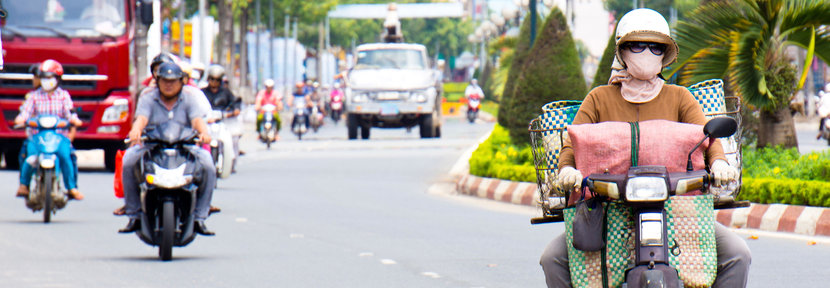Vidéo : 7 min
11 mars 2025
SANTÉ COMMUNAUTAIRE ET MONDIALE
Vidéo
Devasena Gnanashanmugam, M.D., vice-présidente des Affaires médicales, discute du programme d’accès mondial de Cepheid
En direct de la Conférence mondiale de l’Union sur la santé pulmonaire 2024 à Bali en Indonésie, la vice-présidente des Affaires médicales de Cepheid, Devasena Gnanashanmugam, explique comment le programme d’accès mondial de la société s’attaque aux maladies comme la tuberculose pour permettre des tests de diagnostic moléculaire partout.
Gnanashanmugam explique que le programme a été fondé en 2011 avec pour vision un accès équitable aux nouveaux diagnostics moléculaires révolutionnaires. Aujourd’hui, le programme d’accès mondial de Cepheid atteint toutes les régions du monde touchées par des maladies mortelles telles que la tuberculose, le VIH et Ebola.
Intervenant 1 : Eh bien, nous allons maintenant découvrir comment le programme d’accès mondial de Cepheid s’attaque aux maladies comme la tuberculose dans le but de permettre des tests de diagnostic moléculaire partout. Et nous sommes rejoints par leur vice-présidente des Affaires médicales, Devasena Gnanashanmugam. C’est un plaisir de vous avoir, Devasena. Merci beaucoup de vous être joints à nous.
Devasena Gnanashanmugam : Merci de m’avoir invitée.
Intervenant 1 : J’adorerais en savoir un peu plus sur votre parcours. Et je sais que vous venez du côté pédiatrique des soins de santé et que vous êtes aussi un médecin spécialisé dans les maladies infectieuses, ce qui est une spécialité importante.
Devasena Gnanashanmugam : Oui, oui. Vous avez raison. Je me suis formée en tant que spécialiste des maladies infectieuses pédiatriques, et peu après avoir terminé ma formation, je suis allée dans le domaine de la recherche. Avant de rejoindre Cepheid, je travaillais pour les National Institutes of Health aux États-Unis. Et c’est vraiment là que ma passion pour la tuberculose et le VIH et et mon envie de répondre spécifiquement aux besoins des enfants se sont développées, plutôt comme une extension de ma formation.
Intervenant 1 : Et pourquoi avez-vous rejoint Cepheid ? Qu’est-ce qui vous a attiré dans l’entreprise ?
Devasena Gnanashanmugam : Comme je l’ai mentionné, je travaillais au NIH et j’ai beaucoup appris sur Cepheid et son produit pour diagnostiquer la tuberculose. J’avais donc une bonne connaissance de la tuberculose et de ce que Cepheid faisait dans l’espace avant de venir dans l’entreprise, tout le travail qu’ils avaient fait et leur attention portée sur les diagnostics et l’amélioration des diagnostics pour les pays à revenu faible et intermédiaire. C’est ma passion depuis longtemps. Je suis allée à l’école de médecine en Inde, alors j’ai vu directement quel était le fardeau dévastateur de la maladie sur la population en général.
Intervenant 1 : Et en ce qui concerne le Programme d’accès mondial de l’entreprise, de quoi s’agit-il exactement et pourquoi et quand a-t-il réellement commencé ?
Devasena Gnanashanmugam : Il existe depuis 2010 et il a vraiment commencé à permettre à plus de personnes d’avoir accès à nos produits. Il s’agit donc d’un programme axé sur l’équité et permettant aux populations qui n’ont pas autant de ressources d’accéder à ces produits qui sauvent des vies. Cela a joué un rôle fondamental dans le travail de santé mondial de Cepheid.
Intervenant 1 : Et juste en termes d’objectifs, comment réalisez-vous ce travail ? Qui y est éligible ?
Devasena Gnanashanmugam : Et bien, presque tous les pays considérés comme des pays à forte prévalence, qui sont financés et qui disposent d’un financement partiel du Fonds mondial sont membres et peuvent être éligibles au programme. Et pour être honête, il n’y a pas de règle très stricte concernant qui est éligible et qui ne l’est pas. Par exemple, vous pourriez être un client plus intéressé par nos produits contre le VIH et vous seriez toujours considéré comme quelqu’un qui pourrait être éligible au programme. Il n’est donc même pas limité à la tuberculose.
Intervenant 1 : Et à quoi ressemble le travail d’aujourd’hui dans l’espace TB dans le cadre du Programme d’accès mondial ?
Devasena Gnanashanmugam : Alors c’est encore une fois très large. Nous avons de nombreux membres dans le programme, et le point que je pense être central est que le programme est vraiment axé sur le fait d’obtenir les personnes qui ont le plus besoin de nos produits, de comprendre leurs défis et leurs obstacles, et d’aider à les gérer du niveau du client jusqu’au niveau du ministère.
Intervenant 1 : Et beaucoup de gens parlent de donner la priorité aux pays à revenu faible et intermédiaire, alors comment l’entreprise pense-t-elle à la résolution des problèmes liés à la tuberculose en collaboration avec d’autres priorités de maladies dans ces pays à revenu faible et intermédiaire ?
Devasena Gnanashanmugam : Cela concerne justement cette collaboration. Par exemple, comme je l’ai mentionné, nous avons également des produits contre le VIH. Il s’agit donc vraiment de comprendre que nous avons une plateforme qui permettra de diagnostiquer plusieurs maladies avec un seul instrument. Comprendre où les gens vont pour recevoir des soins. Parce que comme vous pouvez l’imaginer, si vous êtes une personne qui ne va pas bien, vous ne vous dites pas nécessairement : « Bon, je sais que je dois aller à ce programme sur la tuberculose ou sur le VIH. » Vous voulez vous rendre dans un endroit où vous pouvez obtenir des soins complets. Et c’est vraiment là que nous essayons de faire beaucoup plus de travail en comprenant et en permettant aux gens d’obtenir des diagnostics de maladies multiples en un seul endroit.
Intervenant 1 : Je pense qu’il serait formidable de partager avec nous peut-être quelques exemples du programme d’accès mondial en action qui, selon vous, a un réel impact sur les objectifs mondiaux de santé publique.
Devasena Gnanashanmugam : Bien sûr. Comme les gens le savent très bien, nous avons le programme TB qui existe depuis de nombreuses années maintenant, et c’est un programme qui a permis l’accès au diagnostic de la tuberculose dans tant de régions du monde. En outre, nous avons également travaillé avec des chercheurs qui ont évalué notre produit pour le diagnostic précoce des nourrissons, comme le programme Baby Cure en Afrique du Sud. Cela a permis à de nombreux nourrissons d’être identifiés très tôt comme infectés par le VIH.
Un autre exemple de notre travail est la réponse à Ebola. Nous disposions d’un produit qui permettait aux personnes à risque d’Ebola de vivre alors que l’épidémie était assez coûteuse en RDC et dans d’autres pays. Cepheid a vraiment essayé de se concentrer sur les besoins des pays à revenu faible et intermédiaire au fur et à mesure qu’ils se produisaient, et cela fait partie intégrante du Programme d’accès mondial.
Intervenant 1 : Et qu’est-ce qui vous rend optimiste, ou êtes-vous optimiste quant à la lutte mondiale contre la tuberculose pour parvenir à l’élimination d’ici 2030 ? Et évidemment, la pandémie mondiale a un peu perturbé les choses, n’est-ce pas ?
Devasena Gnanashanmugam : En effet. Je suis optimiste. Ce que nous voyons maintenant, ce sont tant d’autres acteurs sur le terrain et tant de personnes qui ont des idées innovantes qui font vraiment avancer les choses sur le terrain. Au cours des dernières années, nous avons constaté une réelle accélération des médicaments disponibles pour les gens, et plus de diagnostics disponibles pour plus de monde. Ce que je vois, c’est un réel changement par rapport à où on en était il y a 15 ou 20 ans. Donc, si nous continuons à ce rythme, je pense que nous allons accomplir beaucoup plus.
Intervenant 1 : Devasena, c'était un plaisir absolu de vous avoir ici sur Union Live. Merci beaucoup pour votre disponibilité.
Devasena Gnanashanmugam : Merci de m’avoir invitée.
Intervenant 1 :
Merci.
Lire la suite
PLUS







